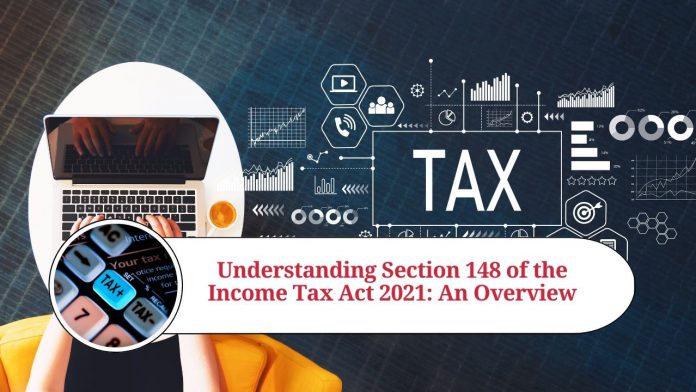The Income Tax Act, 2021 is the latest legislation governing income tax in India. Section 148 of the Income Tax Act 2021 is a crucial provision that empowers the Income Tax Department to issue notices for re-assessment of income in certain circumstances.
The purpose of this article is to provide a comprehensive overview of Section 148 of the Income Tax Act 2021 and its implications for taxpayers.
What is Section 148 of the Income Tax Act 2021?
Section 148 of the Income Tax Act 2021 deals with the power of the Income Tax Department to issue notices for re-assessment of income. This provision allows the Income Tax Department to re-open a completed assessment and assess the income of a taxpayer afresh.
Under this provision, the Income Tax Department can issue a notice for re-assessment of income if it has reason to believe that:
- Income chargeable to tax has escaped assessment for any assessment year; or
- Such income has been under-assessed or assessed at too low a rate; or
- Such income has been assessed, but a part of it has escaped assessment.
In simple terms, if the Income Tax Department has reason to believe that any income of the taxpayer has escaped assessment or has been under-assessed, it can issue a notice under Section 148 to re-open the assessment and assess the income afresh.
What are the implications of Section 148 for taxpayers?
Section 148 has significant implications for taxpayers. If the Income Tax Department issues a notice under this provision, it means that the taxpayer’s income for a particular assessment year will be re-assessed.
The re-assessment can result in an increase in the tax liability of the taxpayer. If the Income Tax Department discovers that the taxpayer’s income has been under-assessed or assessed at too low a rate, it can demand additional tax along with interest and penalty.
Therefore, it is important for taxpayers to understand the provisions of Section 148 and comply with the income tax laws to avoid any potential liability in the future.
What is the procedure for re-assessment under Section 148?
The procedure for re-assessment under Section 148 is as follows:
- Notice for re-assessment: The Income Tax Department issues a notice to the taxpayer under Section 148, stating the reasons for re-opening the assessment.
- Response to notice: The taxpayer must respond to the notice within the specified time period and provide all the relevant details and documents as required by the Income Tax Department.
- Assessment proceedings: The Income Tax Department conducts assessment proceedings and assesses the income of the taxpayer afresh.
- Demand for additional tax: If the Income Tax Department discovers that the income of the taxpayer has been under-assessed or assessed at too low a rate, it can demand additional tax along with interest and penalty.
- Appeal against re-assessment: If the taxpayer is aggrieved by the re-assessment, he/she can file an appeal with the Appellate Authority.
What are the time limits for re-assessment under Section 148?
The time limits for re-assessment under Section 148 are as follows:
- Within four years from the end of the relevant assessment year: If the income of the taxpayer has escaped assessment for any assessment year, the Income Tax Department can issue a notice for re-assessment within four years from the end of the relevant assessment year.
- Within six years from the end of the relevant assessment year: If the income of the taxpayer has been under-assessed or assessed at too low a rate, the Income Tax Department can issue a notice for re-assessment within six years from the end of the relevant assessment year.
Conclusion
In conclusion, Section 148 of the Income Tax Act 2021 plays a crucial role in ensuring the proper assessment of income tax returns. The provision allows the Income Tax Department to issue a notice for reassessment of an individual’s income tax returns within four years from the end of the relevant assessment year, subject to certain conditions. The section empowers the tax authorities to scrutinize any income or assets that may have escaped assessment or were understated by the taxpayer. Non-compliance with the notice may lead to penal consequences. Therefore, taxpayers should maintain accurate records and comply with the provisions of the Income Tax Act to avoid any legal repercussions. It is advisable to seek professional assistance to navigate the complexities of Section 148 and other provisions of the Income Tax Act.
Read more useful content:
- section 234e of income tax act
- section 286 of income tax act
- section 90a of income tax act
- section 40a(7) of income tax act
- section 226(3) of income tax act
- section 24 of income tax act
Frequently Asked Questions (FAQs)
Q: What is Section 148 of the Income Tax Act 2021?
A: Section 148 is a provision in the Income Tax Act 2021 that empowers the Income Tax Department to issue notices for re-assessment of income in certain circumstances.
Q: When can the Income Tax Department issue a notice under Section 148?
A: The Income Tax Department can issue a notice under Section 148 if it has reason to believe that income chargeable to tax has escaped assessment for any assessment year, such income has been under-assessed or assessed at too low a rate, or a part of such income has escaped assessment.
Q: What are the implications of Section 148 for taxpayers?
A: If the Income Tax Department issues a notice under Section 148, it means that the taxpayer’s income for a particular assessment year will be re-assessed, which can result in an increase in tax liability.
Q: What is the procedure for re-assessment under Section 148?
A: The procedure for re-assessment under Section 148 includes issuance of notice, response to notice, assessment proceedings, demand for additional tax, and appeal against re-assessment.
Q: What are the time limits for re-assessment under Section 148?
A: The time limits for re-assessment under Section 148 are four years from the end of the relevant assessment year if the income has escaped assessment and six years from the end of the relevant assessment year if the income has been under-assessed or assessed at too low a rate. However, in certain cases, the time limit can be extended up to 16 years from the end of the relevant assessment year.
Q: Can the taxpayer object to the notice issued under Section 148?
A: Yes, the taxpayer can object to the notice issued under Section 148 and request the Income Tax Department to withdraw the notice if he/she feels that the notice has been issued without any valid reason.
Q: Can the taxpayer file an appeal against the re-assessment under Section 148?
A: Yes, the taxpayer can file an appeal against the re-assessment under Section 148 with the Appellate Authority if he/she is aggrieved by the re-assessment.
Q: What precautions should a taxpayer take to avoid re-assessment under Section 148?
A: The taxpayer should ensure that his/her income tax returns are filed on time and all income and deductions are accurately disclosed. Additionally, the taxpayer should maintain proper records and documents to substantiate the income and deductions claimed in the return.




















